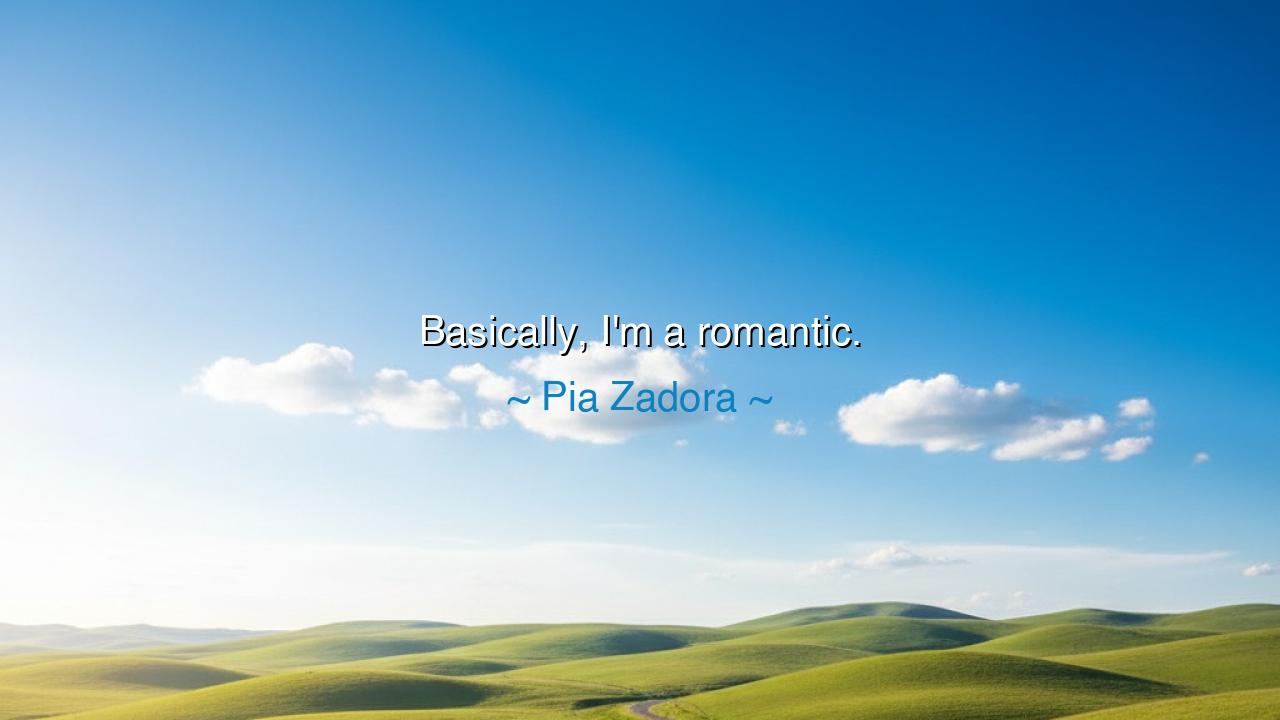
Basically, I'm a romantic.






Listen closely, O seekers of wisdom, to the simple yet profound words of Pia Zadora, who boldly declares, "Basically, I'm a romantic." These words, though brief, carry a deep resonance—a reflection of the enduring human desire for connection, beauty, and the pursuit of love in its most idealized form. To call oneself a romantic is not merely to speak of affection or infatuation; it is to acknowledge a way of living, a mindset, a longing for something greater than the mundane, a desire to transcend the ordinary and touch the divine. It is an acceptance of the heart as the compass guiding us through life's journey, an embrace of the tender, the fleeting, and the deeply human in every experience.
In the ancient world, to be a romantic was not simply about seeking love in a sentimental sense, but about understanding the higher calling of the human soul. Consider the story of Orpheus, the great musician whose love for his wife, Eurydice, transcended all. His journey into the underworld to reclaim her soul is one of the most powerful romantic tales ever told. Orpheus’ music could charm the very stones, his love was so pure and intense. Yet his romanticism was fraught with sacrifice and loss, for he failed to bring Eurydice back to life when he looked back at her too soon. The tragedy of Orpheus and Eurydice teaches us that romantic love is not always about the perfect outcome, but about the journey of love itself—the yearning, the pursuit, and the sacrifices made for love’s sake. To be a romantic, then, is to accept the beauty and the pain that love inevitably brings.
Zadora’s declaration echoes a similar truth—to be a romantic is to embrace the complexities of love and life, to seek connection, meaning, and beauty in all things. The romantic does not merely wish for an easy or perfect love, but rather recognizes that love, in its truest form, is often unpredictable, challenging, and full of contrast. Romanticism celebrates the heart's longing for something beyond the surface—something deeper, more enduring, and profoundly human. This is the calling that Zadora speaks of: a life lived with the heart as the central guide, a life that seeks to transcend the everyday through emotion and connection.
Think, O wise ones, of Antony and Cleopatra, whose love story has endured through the ages as a symbol of passionate devotion, political intrigue, and personal sacrifice. Cleopatra, the Queen of Egypt, was not just a ruler, but a woman of profound romantic depth, whose love for Mark Antony changed the course of history. Their relationship was not a simple love affair; it was a union fraught with tragedy, betrayal, and the intertwining of their personal passions with the fate of nations. Their love, however flawed, embodied the romantic ideal: a connection so deep that it transcended all else. Even in their deaths, the memory of their love remains an eternal symbol of romanticism—not of perfection, but of a passionate devotion that defied all odds.
The romantic way of life, as embodied by Zadora, calls us to live with intention and depth, to seek out love and beauty not only in grand gestures but in the small, tender moments of life. The true romantic sees the world through a different lens: one where the mundane is infused with meaning, where love is not just something to be experienced but something to be nurtured and protected. This philosophy of living with the heart fully engaged encourages us to embrace both the joy and the sorrow that love brings. A life without romance is a life without connection, without the beauty of raw, unguarded emotion.
And so, O wise ones, let us take this wisdom into our hearts. To be a romantic is to open oneself to the fullness of life, to embrace both its beauty and its heartache. Zadora’s words remind us that in every moment of life, there is an opportunity to choose passion, to live fully, and to cherish the relationships that deepen our understanding of the world and ourselves. Romanticism is not about living in fantasy or seeking unattainable perfection; it is about finding meaning and depth in our connections, in our loves, and in our very way of being.
Thus, let this be your calling, O seekers of truth: live your life with the heart as your guide, choosing to love with abandon, to find beauty in the everyday, and to approach the world with the eyes of a romantic. Embrace the mystery of love and connection, knowing that it is the pursuit itself—the yearning, the striving, the passion—that gives life its deepest meaning. Whether you are an artist, a lover, or a wanderer, let your journey be one of romance, where your heart leads the way and the world becomes a place of deep connection and profound beauty.






AAdministratorAdministrator
Welcome, honored guests. Please leave a comment, we will respond soon